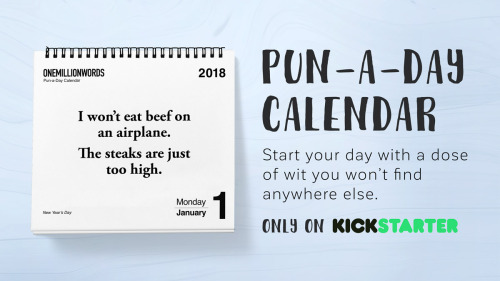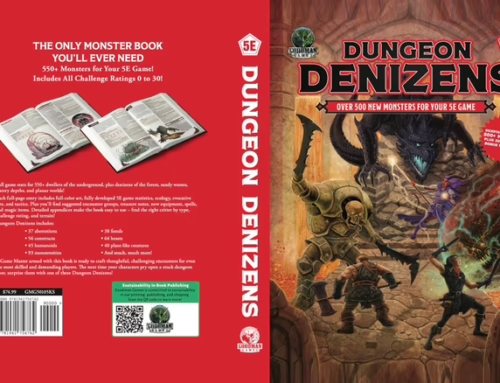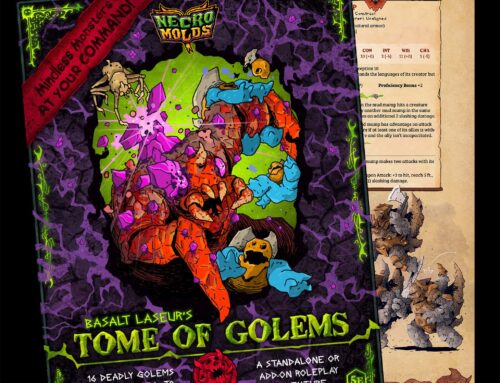
I never thought I’d have to raise $10,000 in 60 days.
In my defense, I expected I’d have longer—at least four months to mobilize a small army of backers. But instead of securing an average of, say, $83 a day, I’m now looking at a goal of $167 per day.
And I’m already behind.
I’m referring to the Kickstarter campaign I launched last week. In between attempts to increase the sales of my published novels and preparation of new books for publication, I decided to pursue a new revenue stream: a Pun-a-Day Calendar featuring my wittiest wordplay.
(What, you thought I was joking when I mentioned this possibility in January?)
Here’s the blurb:
Start your day with a dose of wit you won’t find anywhere else.
When I’m not writing and publishing novels, I post puns on social media. I get more likes and followers with #wordplay than any other kind of post. Which leads me to believe there are others out there whose minds appreciate and perhaps even crave puns.
To appease this underground — punderground? — faction, I’m creating a page-a-day calendar featuring my off-the-beaten-path brand of wordplay.
The Pun-a-Day Calendar chronicles several years’ worth of wordplay. These are original creations. If you’ve heard it before, you won’t find it in my calendar (unless you’re already following me on Twitter, of course). Topics cover all manner of miscellany, from food and folk songs to comic books and the Bible.
Since I didn’t have $10,000 of startup capital just lying around for the print run of 500 calendars, I thought I’d give Kickstarter a shot. For those who don’t know, “Kickstarter helps artists, musicians, filmmakers, designers, and other creators find the resources and support they need to make their ideas a reality.”
It works like this:
- Someone—let’s say a writer—comes up with an idea to create something, but he needs funding to move forward.
- So he creates a campaign at Kickstarter to see if there is any interest and, ultimately, to drum up investors.
- He comes up with the price for the product (e.g. $20) and creates pledge tiers, adding extra prizes and incentives to encourage people to pledge more.
- He chooses somewhere between 30 and 60 days (but not 120) for the lifespan of the campaign.
- Then he does whatever he can to spread the word about the campaign, hoping that enough people pledge and that he reaches his goal before deadline.
- If the campaign is successful, the writer gets to complete his project, and everybody gets what they ordered. But if the campaign fails to meet its goal, no one pays anything and nothing gets made.
If I do not reach my goal by April 15, no one gets the Pun-a-Day Calendar.
Which is why I need your help in spreading the word to anyone and everyone who likes puns, quips, and wordplay. Teachers, writers of all kinds, and other creative types seem to fit this category, but no need to limit it to just them. The more the merrier!
If you’re interested in supporting my dream of flooding the world with wordplay, there’s a lot more information about the Pun-a-Day Calendar here: https://www.kickstarter.com/projects/1620958229/pun-a-day-calendar
Wait, what do I need to do?
If I’ve learned anything about Kickstarter over the past week, it’s that many people don’t know much about it. If you’re interested in backing my Pun-a-Day Calendar campaign, here’s all you need to do:
- Scroll down and click the big green button that says “BACK THIS PROJECT.”
- Now you’ll have four options for backing the campaign:
- You can pledge money for no reward.
- You can pledge $5 or more to get the e-book version of my fantasy novel Rebels and Fools.
- You can pledge $20 or more to get the Pun-a-Day Calendar itself.
- You can pledge $35 or more to get the Pun-a-Day Calendar as well as e-book versions of Rebels and Fools, Heroes and Liars, and Martyrs and Monsters.
- No matter what option you choose, every dollar goes toward the project’s $10,000 goal.
- Next, you’ll need to create a Kickstarter account and enter your credit card information. (But remember, you won’t be billed unless/until the campaign reaches its goal.)
- On April 15, you’ll be notified whether or not the project got enough backing. If it does, you’ll get your calendar and/or other prizes in the months to come. If not, your credit card won’t be billed.
Not too difficult, right? Anyway, life is full of new experiences. And if this campaign proves successful, I’ll be learning even more as I publish my first calendar.



Leave a comment